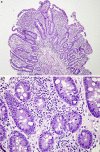Ipilimumab-Induced Enteritis without Colitis: A New Challenge
- PMID: 27920706
- PMCID: PMC5126596
- DOI: 10.1159/000452403
Ipilimumab-Induced Enteritis without Colitis: A New Challenge
Abstract
Introduction: Ipilimumab is an immune checkpoint inhibitor targeting cytotoxic T-lymphocyte associated antigen 4 (CTLA4), approved to treat metastatic melanoma. It was the first therapy shown to prolong survival in a large, randomized clinical trial. However, immune-related adverse events are common and can be severe. Enterocolitis is a common adverse event with ipilimumab, but enteritis without colitis has not been previously described.
Case report: An 83-year-old man presented to our hospital with grade 3 diarrhea for 5 days. One month prior, he had started treatment with ipilimumab for metastatic melanoma. On presentation, he was found to have severe electrolyte disturbances, including hyponatremia, hypokalemia, and acute kidney injury. Causes of infectious diarrhea were excluded, and he was treated with corticosteroids for presumed ipilimumab-associated enterocolitis. However, colonoscopy revealed normal mucosa, both grossly and on pathology of random biopsies. Steroids were weaned but his symptoms recurred. He then underwent upper endoscopy with enteroscopy. Biopsy of the duodenum was notable for acute inflammation, villous blunting, and other changes consistent with ipilimumab-associated injury. He was restarted on high-dose steroids and his symptoms resolved.
Discussion: Ipilimumab-induced enteritis is a serious and potentially life-threatening immune related adverse event that warrants prompt recognition and aggressive management. As in cases of ipilimumab-associated enterocolitis, steroids are an effective therapy. Enteritis without colitis should be suspected in patients on ipilimumab who present with severe diarrhea but have a normal colonoscopy.
Keywords: CTLA4 inhibitor; Colitis; Enteritis; Immunotherapy; Ipilimumab; Melanoma.
Figures




References
Publication types
Grants and funding
LinkOut - more resources
Full Text Sources
Other Literature Sources
Research Materials

